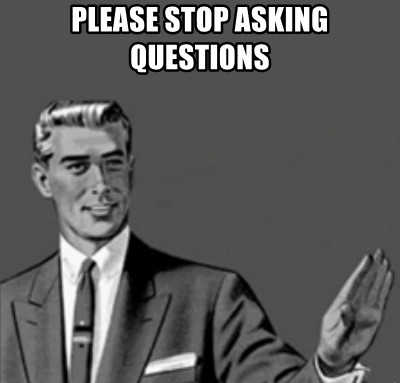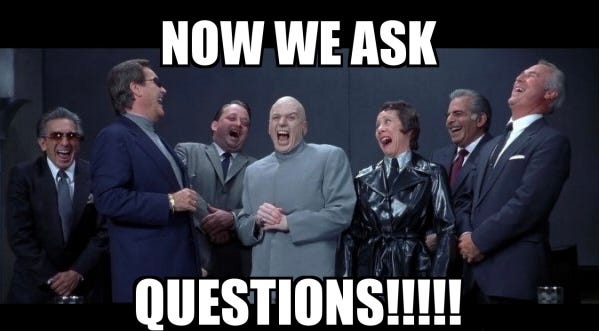I decided to create a section called THE CONTRARIAN. Here I reflect on popular phrases and take the opposite side of their fundamental premise.
Even if there are relative truths to be found in them, I propose a contrarian view to the universal wisdom they claim.
Asking questions is a good thing; knowing how to ask relevant question is definitely a better one.
When one is genuinely ignorant about something always the smart thing to do is to ask a question. In fact it is probable that a very large proportion of people would like to ask the same questions but many times don’t have the courage to ask them. From this perspective of course that asking any question that helps build knowledge and ensure clear understanding is a good question. These are what I call “the just questions” because they can be smart, ignorant or dumb but they are well-intended and help no matter what.
There’s nothing wrong here. Let’s agree on this and move on.
However there is also the possibility that all you always have to ask are “dumb” questions, and maybe even too many of them; which could reflect - if a pattern - lack of preparedness, lack of depth, lack of understanding of what you should already understand and lack of ability to connect the dots. In this case, while well-intended, they may be flagging that it would be better to kick it up a notch in terms of how you prepare and how you show up.
There is also a last category which is the “too many dumb” questions. Not only you start showing you have not prepared, but you indeed only ask them to have airtime, to make it look like you are engaged and thoughtful. This is probably the worst case within the “dumb” question category. You are not prepared and you are not making sense.
“You can tell whether a man is wise by his questions.”
Naguib Mahfouz.
The Gates of Hell …
the myth that 'there's no such thing as a stupid question'
As we progress in the analysis and dissect more carefully all the possible questions that can be asked in a conversation, an interview, in front of a large audience or in a team meeting; we may encounter a very different category of thinking to be careful with.
This is because there are many types of possible questions that have little to do with the genuine desire to understand or help unlock a problem, and a lot to do with... well, with something else.
The idea that there are no stupid questions implies the inherent innocence of the person asking the question and their genuine curiosity. But forgets how the manipulative and the perverse may find their way in under the powerful umbrella of the “dumb question”.
Someone can ask a very wrong question for the audience and the context, a carefully designed evil question ready to hurt, a well crafted poisonous question perfect to mud the waters, a powerful divisive question aimed at feeding a controversy or adding to a problematic bias in the argument.
There is also the missile questions: either openly aggressive as precise attacks on target, or calmly passive-aggressive (the answer is implicit) to make you act defensive.
There is no real question behind any of these “questions”.
I will not provide concrete examples here as I want these posts to act as “leadership sparks” to trigger reflections and not as long writings on any given subject… But trust me we could spend hours writing down questions that have nothing to do with the search of truth because they offer no possibility for genuine enquiry, in fact they close it down. They act as ways of poisoning the public discourse or the quality of a conversation. Watch out for those and don’t fall in the trap with your reactions.
You can't control the question asked, but you can control the answer not given and the reaction not had when you find them coming at you.
While I strongly believe that any genuine question that seeks to understand is valid and should always be asked; we also have to remember that refining the art of asking questions is a major competency, a sophisticated skill that great leaders have. So we should all try to aim a bit higher over time if we want our questions to help connect the dots and act like keys that open locks… for better communication, for better understanding, for better outcomes.
“Never ask a question unless the answer makes a difference.”
Proverb.
P.S. Before I go, here you have “The Treat,” where I share some of the music that made me company while writing … Enjoy as you bid farewell to this post
Lead yourself, Learn to live. Lead others, Learn to Build.
If you enjoyed reading this post consider subscribing to the newsletter, joining the community and sharing your thoughts.









This is a good one, Sebastian! I’ve always believed that “There are no stupid questions” is just an excuse for mediocrity and laziness of mind. People tend to abuse the forgiving nature of it. Asking questions is in fact a form of art, it’s like a game of chess: the outcome is determined by the right inputs. Thank you for bringing up this subject!